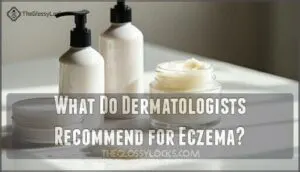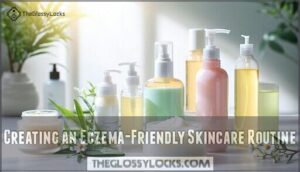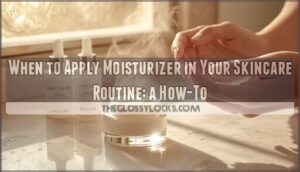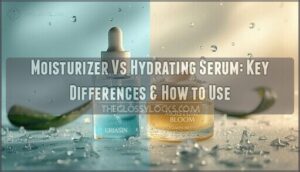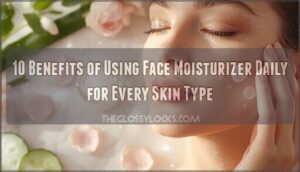This site is supported by our readers. We may earn a commission, at no cost to you, if you purchase through links.

Top dermatologist picks include CeraVe Moisturizing Cream, Vanicream Sensitive Skin Moisturizer, and La Roche-Posay Eczema Relief Cream.
These products restore your skin’s protective barrier without harsh chemicals or irritating fragrances.
Avoid products with sulfates, parabens, or artificial scents—they’re like throwing gasoline on a fire when you’re dealing with sensitive skin.
The right moisturizer can transform your daily routine from dreaded to manageable. From targeted treatment balms to gentle everyday lotions, discover which specific ingredients make all the difference.
Table Of Contents
- Key Takeaways
- Choosing Hypoallergenic Products
- Top 9 Hypoallergenic Products for Eczema
- 1. Vanicream Sensitive Skin Moisturizer
- 2. CeraVe Moisturizing Cream Dry Skin
- 3. La Roche-Posay Eczema Relief Cream
- 4. Aveeno SPF 60 Moisturizing Body Lotion
- 5. Aquaphor Healing Ointment Dry Skin Relief
- 6. Aveeno Eczema Relief Balm
- 7. La Roche-Posay Lipikar AP+ Triple Repair Cream
- 8. Naked Bee Hand & Cuticle Salve
- 9. Shea Butter Body Butter for Melanin Rich Skin
- Common Product Triggers to Avoid
- Dermatologist Recommendations for Eczema
- Creating an Eczema-Friendly Skincare Routine
- Frequently Asked Questions (FAQs)
- What skincare products are good for eczema sensitive skin?
- What is the most gentle cream for eczema?
- What do dermatologists recommend for eczema?
- Is CeraVe ok for eczema?
- Is eczema a hypersensitivity skin disorder?
- What product to avoid if you have eczema?
- How often should I apply moisturizer to eczema-prone skin?
- Can eczema-friendly products be used on other skin conditions?
- Are there any natural ingredients that can trigger eczema?
- Can I use scented products if I have mild eczema?
- Conclusion
Key Takeaways
- Choose fragrance-free, ceramide-rich formulas – You’ll want products like CeraVe Moisturizing Cream or Vanicream that skip harsh chemicals and focus on rebuilding your skin’s protective barrier without triggering flare-ups.
- Avoid common irritants at all costs – You should steer clear of sulfates, parabens, artificial fragrances, and dyes since they’re like throwing gasoline on fire when dealing with sensitive, eczema-prone skin.
- Apply moisturizer to damp skin twice daily – You’ll get maximum hydration by using the "soak and seal" method within three minutes of bathing, then reapplying before bed to maintain your skin barrier.
- Consult a dermatologist for personalized care – You can’t guess your way to healthy skin, so work with a specialist who’ll identify your specific triggers and create a treatment plan beyond over-the-counter options.
Choosing Hypoallergenic Products
When selecting hypoallergenic products for your eczema-prone skin, start by identifying your specific triggers through patch testing or keeping a skincare diary.
You’ll want to prioritize products recommended by dermatologists and those bearing the National Eczema Association’s Seal of Acceptance to verify they’re free from common irritants, which can help you find the right hypoallergenic products.
Identify Sensitive Skin Triggers
Finding your sensitive skin triggers requires careful observation of environmental factors and dietary impacts.
Track potential triggers like fragrances, soaps, and seasonal changes in a skin diary.
Notice stress influence and allergen exposure patterns.
Irritant identification helps prevent eczema flare-ups.
Hypoallergenic products reduce skin irritation risks when you know your specific triggers.
Prioritize Dermatologist Recommendations
Once you’ve identified your skin triggers, partnering with a dermatologist becomes your next smart move.
These skin experts offer dermatologist recommended eczema solutions that go beyond trial-and-error shopping. A dermatologist consultation provides the roadmap you need for effective long-term management of your condition.
- Expert Treatment Plans combine prescription strength options with hypoallergenic eczema products suited to your specific needs
- Personalized Skincare Advice helps you navigate product labels and avoid identifying irritants that worsen flare-ups
- Professional guidance guarantees you’re using the right eczema relief cream formulations for maximum effectiveness
Top 9 Hypoallergenic Products for Eczema
Finding the right hypoallergenic products for eczema can feel overwhelming, but these nine picks have proven track records for sensitive skin.
Each product contains gentle, dermatologist-recommended ingredients that soothe irritation without triggering flare-ups, making them suitable for sensitive skin.
1. Vanicream Sensitive Skin Moisturizer
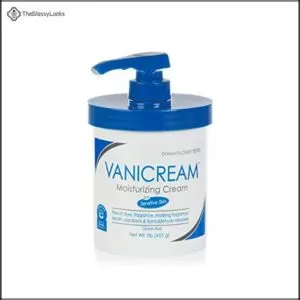
This reliable moisturizer tackles sensitive skin’s biggest challenges with proven effectiveness.
Vanicream Sensitive Skin Moisturizer earned the National Eczema Association’s Seal of Acceptance by eliminating common irritants like fragrances, dyes, and parabens.
You’ll find it works exceptionally well for eczema, psoriasis, and everyday dryness without clogging pores.
The thick, non-greasy formula absorbs completely while providing long-lasting hydration that reduces redness and irritation within days.
Best For: People with sensitive, eczema-prone, or allergy-prone skin looking for a gentle, hydrating moisturizer that avoids common irritants.
- Free from fragrance, dyes, lanolin, parabens, and formaldehyde releasers.
- Dermatologist-recommended and suitable for face and body, even on infants and children.
- Non-greasy formula that provides long-lasting hydration and calms irritated skin.
- Thick consistency requires thorough rubbing and may not layer well under makeup.
- Some users dislike the unscented aroma, finding it slightly unpleasant.
- Packaging style varies and jar version may be less convenient for travel.
2. CeraVe Moisturizing Cream Dry Skin
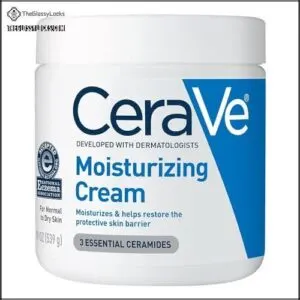
Several million people swear by CeraVe Moisturizing Cream for good reason.
This dermatologist-developed powerhouse combines three essential ceramides with hyaluronic acid to restore your skin’s natural barrier while delivering 24-hour hydration.
The MVE technology releases moisturizing ingredients gradually, so you’re not constantly reapplying.
It’s fragrance-free, paraben-free, and non-comedogenic, making it gentle enough for sensitive skin yet effective for stubborn dryness.
Clinical studies show 80% improvement in dry skin symptoms after four weeks.
Whether you’re dealing with eczema flare-ups or just need reliable daily moisture, this cream works overtime.
Best For: People with dry, sensitive, oily, or eczema-prone skin seeking gentle, long-lasting hydration.
- Some users with highly sensitive skin experience rare irritation
- Rich texture may feel heavy for those preferring lightweight creams
- Not designed to treat severe or infected eczema without medical guidance
- Provides up to 24-hour hydration using patented MVE technology
- Fragrance-free, paraben-free, and non-comedogenic for sensitive skin
- Clinically proven to improve dryness and support the skin barrier
3. La Roche-Posay Eczema Relief Cream
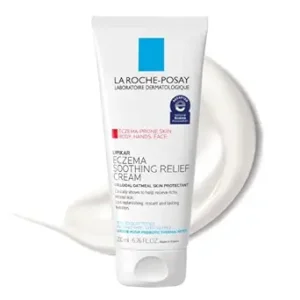
When dealing with stubborn eczema, you’ll want something that packs a punch.
Stop settling for products that promise relief but deliver disappointment—your skin deserves better.
La Roche-Posay Eczema Relief Cream delivers exactly that with its 1% colloidal oatmeal formula that’s clinically proven to calm itchy skin and reduce inflammation.
This steroid-free cream won’t just mask symptoms—it actually restores your skin’s protective barrier with shea butter and glycerin.
The fragrance-free formula means no surprise reactions, and it’s gentle enough for kids over three.
Clinical studies show 73% of users saw improved irritation after just 28 days.
Best For: People with eczema-prone, sensitive, or very dry skin—including children over three—seeking a gentle, steroid-free solution for flare-ups.
- Clinically proven to relieve itching and irritation with 1% colloidal oatmeal.
- Fragrance-free, non-greasy formula safe for face, body, and sensitive areas.
- Recommended by dermatologists and accepted by the National Eczema Association.
- Some users find it can feel slightly greasy or take time to fully absorb.
- May require regular use for best and lasting results.
- Not suitable for children under three years old.
4. Aveeno SPF 60 Moisturizing Body Lotion
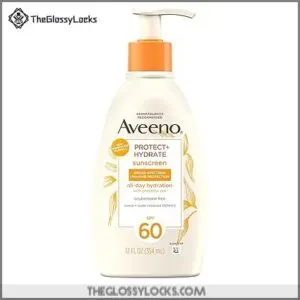
You’ll love Aveeno’s Protect + Hydrate SPF 60 Moisturizing Body Lotion for reliable sun protection that won’t irritate sensitive skin.
This dermatologist-recommended formula combines broad-spectrum UVA/UVB protection with nourishing prebiotic oat, delivering all-day hydration while staying water and sweat-resistant for 80 minutes.
The lightweight, oil-free texture absorbs quickly without greasiness, making it perfect for daily use on eczema-prone skin.
Best For: People with dry, sensitive, or eczema-prone skin who want strong sun protection and hydration without heavy residue.
- Broad-spectrum SPF 60 shields against UVA/UVB rays and helps prevent sun damage.
- Lightweight, non-greasy, and fast-absorbing formula with all-day hydration.
- Hypoallergenic and oil-free, minimizing irritation and breakouts for sensitive skin.
- Contains fragrance, which may bother those with sensitivities despite being labeled "unscented."
- Can sting eyes and leave a chemical taste if applied too close to lips.
- Some users note a slightly oily texture and occasional damaged packaging on arrival.
5. Aquaphor Healing Ointment Dry Skin Relief
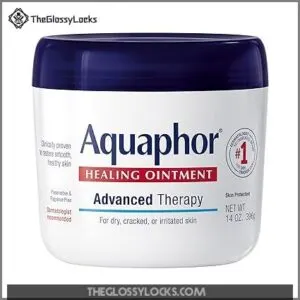
When your skin feels like sandpaper, Aquaphor Healing Ointment steps in as your reliable rescue remedy.
Your skin deserves gentle care that actually works—not harsh products that make things worse.
This dermatologist-recommended powerhouse contains 41% petrolatum, creating a protective barrier that locks in moisture while allowing oxygen to flow for ideal healing.
It’s fragrance-free and preservative-free, making it perfect for sensitive eczema-prone skin.
You’ll love how it tackles dry, cracked skin on hands, feet, and lips.
Though the texture feels heavy and greasy, this multipurpose marvel delivers results that last, making every penny worth it for your skin’s comfort.
Best For: Those with very dry, cracked, sensitive, or eczema-prone skin seeking reliable all-purpose moisture relief.
- Clinically proven to heal and protect extremely dry skin and minor wounds.
- Fragrance-free and preservative-free, ideal for sensitive or allergy-prone users.
- Versatile use for hands, lips, feet, cuts, burns, and post-procedure care.
- Thick, greasy texture may feel heavy for daytime or facial use.
- Contains lanolin alcohol, which can trigger reactions in people with wool allergies.
- Messy tub packaging can be inconvenient for travel or quick touchups.
6. Aveeno Eczema Relief Balm
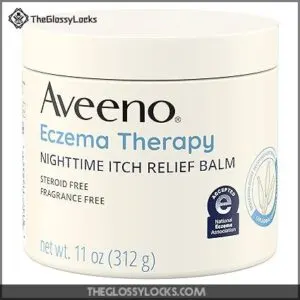
Struggling with stubborn eczema flare-ups? Aveeno Eczema Relief Balm delivers clinically proven results with 1% colloidal oatmeal and ceramides.
This fragrance-free, steroid-free formula provides immediate itch relief while strengthening your skin’s natural barrier.
Clinical studies show 51% reduction in eczema severity within seven days.
The non-greasy texture absorbs quickly, making it perfect for daily use.
Accepted by the National Eczema Association, it’s your reliable partner for managing sensitive, eczema-prone skin effectively.
Best For: Adults and children with sensitive, eczema-prone, or very dry skin seeking immediate itch relief and long-lasting moisture.
- Clinically proven to relieve eczema symptoms and reduce severity within seven days.
- Non-greasy texture absorbs quickly and is comfortable for daily or nightly use.
- Steroid-free, fragrance-free, and hypoallergenic formula is safe for all ages, including infants.
- May cause initial stinging or mild irritation on extremely sensitive or broken skin.
- Less effective during severe eczema flare-ups; alternatives may work better in such cases.
- Cost may be prohibitive for some users without FSA/HSA benefits.
7. La Roche-Posay Lipikar AP+ Triple Repair Cream
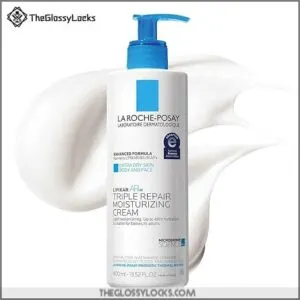
Professional relief awaits with La Roche-Posay’s Lipikar AP+ Triple Repair Cream, your skin’s new best friend.
This fragrance-free powerhouse delivers 48 hours of hydration while being pediatrician-tested for sensitive skin.
Its triple-action formula works like a skilled repair crew:
- Rebalances your skin’s microbiome
- Restores its protective barrier
- Replenishes lipids
Clinical studies show impressive results: 82% of users avoided eczema relapse after one month, while itching decreased by 41%.
The National Eczema Association seal confirms its effectiveness for eczema-prone skin.
Best For: People with dry, sensitive, or eczema-prone skin seeking long-lasting, fragrance-free hydration and barrier repair for face and body.
- 48 hours of hydration with a non-greasy texture
- Clinically proven to reduce eczema flare-ups and soothe irritation
- Safe for babies, children, and adults—including those with highly sensitive or allergy-prone skin
- Multiple pumps may be needed for a normal application
- Takes 15-20 minutes to fully absorb
- May be pricey compared to standard lotions
8. Naked Bee Hand & Cuticle Salve
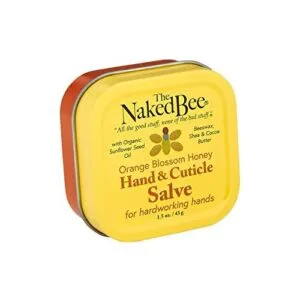
Convenience meets comfort when you’re dealing with eczema-prone skin on your hands.
Naked Bee Hand & Cuticle Salve delivers targeted relief with its blend of organic sunflower seed oil, beeswax, shea butter, and cocoa butter.
This USA-made formula creates a protective barrier while deeply moisturizing rough, cracking skin.
Free from parabens, dyes, and harsh chemicals, it’s gentle enough for sensitive skin yet effective for hardworking hands.
The 1.6-ounce tin absorbs quickly without greasiness, making it perfect for daily use on cuticles, elbows, and heels.
Best For: People with dry, rough, or eczema-prone hands who want natural, gentle, and effective moisturizing relief.
- Deeply hydrates and softens rough skin, cuticles, and heels with organic, nourishing ingredients.
- Free from parabens, dyes, and harsh chemicals, making it gentle for sensitive skin.
- Non-greasy, quick-absorbing formula with a pleasant scent.
- Fragrance may be a concern for those with extremely sensitive skin.
- Tin packaging can be tricky to open or align the lid.
- Not clinically tested specifically for eczema treatment.
9. Shea Butter Body Butter for Melanin Rich Skin
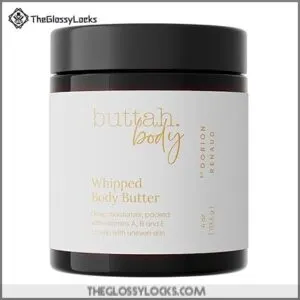
Finding the right body butter for melanin-rich skin can feel like searching for a needle in a haystack.
buttah. by Dorion Renaud’s shea butter formula delivers deep hydration that absorbs quickly without leaving greasy residue.
This hypoallergenic option contains anti-inflammatory compounds that reduce eczema irritation while strengthening your skin’s natural barrier.
The neutral scent won’t overwhelm sensitive noses, and its thick consistency melts beautifully into skin.
Yellow shea butter is richer in vitamins.
However, the 4-ounce size might feel small for daily use, and shipping conditions can affect texture.
Best For: Adults with melanin-rich, dry, or eczema-prone skin seeking deep, non-greasy hydration and gentle barrier support.
- Small 4oz size may require frequent repurchasing for daily use
- Texture can vary due to shipping or formula changes
- Price may feel high compared to quantity provided
- Delivers intense hydration that absorbs quickly without residue
- Contains anti-inflammatory compounds, suitable for sensitive or eczema-prone skin
- Thick, melt-in texture with a neutral, non-overpowering scent
Common Product Triggers to Avoid
When you’re dealing with eczema, it’s like traversing a minefield of potential skin irritants.
Identifying and avoiding common product triggers can save you from unnecessary flare-ups and frustration.
Here are the top culprits that cause the most trouble for sensitive skin:
- Fragrance sensitivity: Even "light" scents can trigger reactions, so always choose fragrance-free products over "unscented" ones.
- Dye avoidance: Artificial colors serve no purpose except to make products look appealing, but they’re notorious for causing irritation.
- Preservative concerns: While necessary for product safety, certain preservatives like formaldehyde-releasers can worsen eczema symptoms.
- Alcohol dangers: Denatured alcohol strips your skin’s natural oils, leaving it vulnerable to further irritation.
Some also experience issues with propylene glycol dermatitis.
Focus on gentle products with minimal ingredients.
Hypoallergenic products specifically designed for sensitive skin eliminate these common triggers while maintaining effectiveness.
Dermatologist Recommendations for Eczema
When managing eczema, dermatologists provide the most reliable guidance for selecting safe and effective products suited to your specific skin needs.
They can recommend prescription treatments when over-the-counter options aren’t enough and help you create a thorough skincare routine that actually works.
What Do Dermatologists Recommend for Eczema?
Most dermatologists recommend gentle, fragrance-free moisturizers with ceramides and emollients for eczema relief.
Popular dermatologist recommended eczema products include CeraVe, Vanicream, and hypoallergenic eczema products from La Roche-Posay.
For severe eczema, they’ll prescribe topical corticosteroids or suggest wet wrap therapy.
Always apply moisturizer to damp skin after bathing to maximize hydration and reduce flare-ups.
Managing bacterial colonization on the skin is also essential for eczema treatment.
Importance of Consulting a Dermatologist
When you’re dealing with eczema, consulting a dermatologist can make all the difference.
These specialists provide expert diagnosis and create personalized skincare plans suited to your specific needs.
A dermatologist consultation offers:
- Accurate skin diagnosis to confirm eczema type
- Comprehensive treatment options beyond over-the-counter products
- Skin trigger identification to prevent future flare-ups
- Long-term care strategies for managing flare-ups effectively
Professional dermatologist recommendations guarantee you’re not just guessing about your skin’s needs.
How to Find a Dermatologist for Eczema
Through your primary care physician, you’ll get personalized dermatologist referrals based on your specific skin symptoms.
Online directories from the National Eczema Association help locate board-certified eczema specialists in your area. Check your insurance coverage first—many pediatric dermatologists accept various plans, and telehealth options expand access substantially.
During appointment preparation, gather photos of flare-ups and symptom histories. This groundwork guarantees your dermatologist consultation addresses your exact needs, whether you need a skin examination or specialized treatment planning for effective eczema management.
Consider the importance of dermatologist qualifications and specialization for superior care.
What to Expect From a Dermatologist Consultation
Your dermatologist consultation typically involves three key steps: skin examination, medical history review, and treatment planning. During this appointment, expect thorough care that addresses your specific eczema concerns and triggers.
Eczema treatment plans may also include advice about probiotic supplement benefits for improved gut health.
What happens during your visit:
- Skin examination – Visual inspection of affected areas and overall skin condition assessment
- Medical history review including family history, current medications, and previous treatments
- Diagnosis process using clinical evaluation and possible patch testing for allergens
- Treatment options discussion covering topical medications, lifestyle adjustments, and skincare routines
- Follow-up care scheduling to monitor progress and adjust dermatologist recommendations as needed
Creating an Eczema-Friendly Skincare Routine
You’ll want to establish a gentle, consistent routine that works with your skin’s needs rather than against them.
A well-planned approach helps prevent flare-ups while keeping your skin barrier healthy and hydrated.
Importance of Moisturizing for Eczema
Think of your skin as a protective wall that needs constant upkeep.
When you have eczema, this wall develops cracks, letting moisture escape and irritants sneak in. That’s where proper moisturizing comes in—it’s like patching those cracks before they become bigger problems.
Here’s why moisturizing matters for your sensitive skin:
- Barrier Repair: Moisturizers rebuild your skin’s protective layer, making it stronger against triggers
- Hydration Frequency: Regular application keeps moisture locked in, preventing that tight, itchy feeling
- Itch Relief: Well-hydrated skin reduces the urge to scratch, breaking the itch-scratch cycle
- Occlusive Benefits: The right moisturizer creates a protective seal, preventing water loss throughout the day
Application Timing is everything—catch your skin while it’s still damp from bathing for maximum absorption.
The soak and seal method can further enhance moisture retention.
How to Choose The Right Moisturizer for Eczema
When selecting an eczema relief cream, consider your ingredient sensitivity first—patch test products containing common allergens like fragrances or preservatives.
Choose texture preferences based on severity: ointments offer maximum occlusive benefits for severe flare-ups, while creams balance hydration with comfort.
Adjust application frequency seasonally, using richer formulations during winter months.
You can find a suitable cream for eczema online to strengthen your eczema skin barrier on eczema prone skin with the best eczema lotion that has ceramides and colloidal oatmeal.
Creating a Skincare Routine for Eczema
Building your eczema skincare routine doesn’t have to feel overwhelming.
Start with these three manageable steps:
- Gentle Cleansing: Choose fragrance-free cleansers that won’t strip your skin barrier
- Hydration Importance: Apply hypoallergenic moisturizer to damp skin within three minutes of bathing
- Trigger Avoidance: Patch Testing new products on a small area before full application
Consistency beats perfection—your sensitive skin will thank you for establishing this protective routine that prioritizes your comfort.
A key element involves using an appropriate skincare routine.
Tips for Maintaining a Healthy Skincare Routine
Consistency makes or breaks your skincare routine. Stick to gentle cleansing twice daily, apply hypoallergenic skincare products to damp skin, and never skip sun protection.
Track your eczema triggers in a journal. Prioritize sleep quality and stress reduction – your skin barrier repairs itself during rest.
Consider diet impact too; omega-3s support sensitive skin care naturally.
Frequently Asked Questions (FAQs)
What skincare products are good for eczema sensitive skin?
You’ll want gentle, fragrance-free moisturizers with ceramides, colloidal oatmeal, and hyaluronic acid. CeraVe Daily Moisturizing Lotion, Aveeno Eczema Therapy Cream, and Vanicream work well for eczema-prone skin.
What is the most gentle cream for eczema?
When your skin throws a tantrum, Vanicream Moisturizing Skin Cream becomes your peacekeeper.
It’s formulated without common irritants like fragrances, dyes, or parabens, making it exceptionally gentle for reactive skin that needs tender care.
What do dermatologists recommend for eczema?
Dermatologists recommend gentle, fragrance-free moisturizers with ceramides and hyaluronic acid, prescription topical treatments when needed, and identifying your specific triggers to avoid flare-ups effectively.
Is CeraVe ok for eczema?
When push comes to shove, CeraVe’s gentle approach works well for eczema-prone skin. It contains ceramides and hyaluronic acid without harsh irritants, making it dermatologist-recommended for daily moisturizing.
Is eczema a hypersensitivity skin disorder?
Yes, eczema is a hypersensitivity disorder. It’s your immune system overreacting to triggers like allergens, stress, or irritants, causing inflammation and that familiar itchy, red skin you’re dealing with.
What product to avoid if you have eczema?
Like traversing a minefield, you’ll want to dodge fragrances, essential oils, dyes, and ethanol in skincare products. These common irritants can trigger flare-ups and worsen your eczema symptoms substantially.
How often should I apply moisturizer to eczema-prone skin?
You should moisturize eczema-prone skin at least twice daily—once after showering on damp skin and again before bed. During flare-ups, apply as needed throughout the day.
Can eczema-friendly products be used on other skin conditions?
Eczema-friendly products often work well for other inflammatory skin conditions like psoriasis, rosacea, and sensitive skin. Their gentle, barrier-repairing formulas can benefit anyone with compromised skin barriers or chronic irritation.
Are there any natural ingredients that can trigger eczema?
Picture your skin as a delicate flower garden where even "natural" visitors can cause chaos.
Essential oils, plant extracts, and fragrances hide in natural products, triggering flares.
You’ll want to avoid botanical ingredients and stick with gentle, tested formulas.
Can I use scented products if I have mild eczema?
You can use lightly scented products with mild eczema, but fragrance-free options are safer.
Fragrances rank among the top skin irritants and can trigger flare-ups even with mild symptoms.
Test new products first.
Conclusion
Finding the right hypoallergenic sensitive skin care products for eczema isn’t rocket science, but it does require patience and the right guidance.
Like Goldilocks searching for the perfect porridge, you’ll need products that are just right—not too harsh, not too weak.
The nine products we’ve covered offer proven solutions that work with your skin’s natural healing process.
Remember, consistency matters more than perfection.
Start with dermatologist-recommended basics, then gradually build your routine, and your skin will thank you for the gentle approach.
- https://allergyasthmanetwork.org/what-is-eczema/eczema-statistics/
- https://www.webmd.com/skin-problems-and-treatments/eczema/ss/slideshow-best-and-worst-cosmetic-ingredients-for-eczema
- https://www.dermaclara.com/blogs/news/hypoallergenic
- https://www.cerave.com/skincare/eczema
- https://nationaleczema.org/blog/6-essential-products-and-ingredients-for-eczema/

